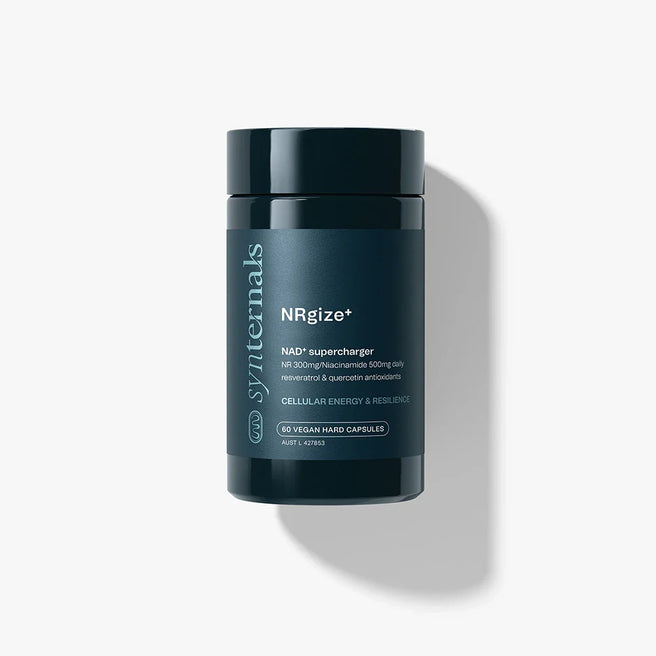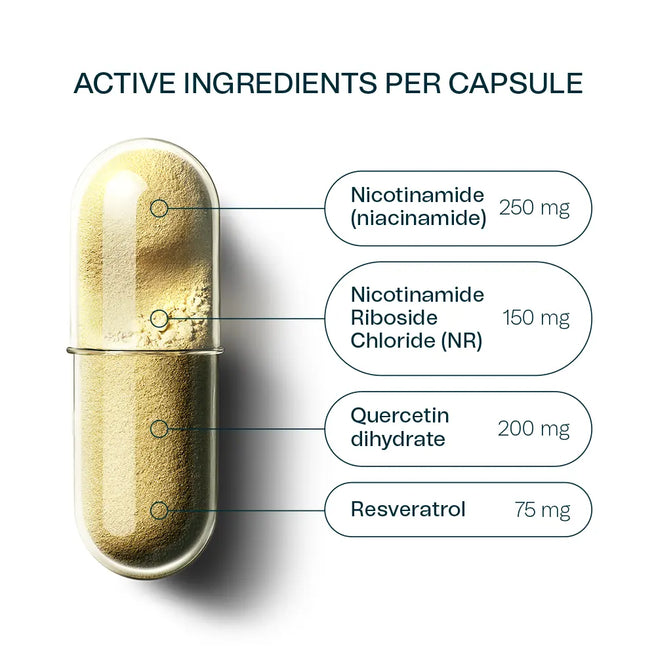Optimising Cellular Health in the Modern World

For many of us, the concept of religiously swallowing daily vitamins conjures an image typically reserved for the elderly rather than the very youthful. So why this shift? How come our grandparents were able to get by without supplements in the prime of their lives? The answer lies in a fascinating interplay between the evolving landscape of health and the impact of modern life on our cellular well-being.
Supplementation Meaning and our Foodscape
First let’s define supplementation. Simply put, supplements are concentrated forms of vitamins, minerals, or other nutrients intended to address potential deficiencies in our diet. In our grandparents' era, the desire for concentrated doses wasn't as prevalent. However, we must be cautious with this line of thinking. Supplements are not a substitute for a well-balanced diet, and whilst it is important to understand the shifting landscape of agriculture may contribute to our cellular health, it does not necessitate a need for supplements.
Soil and Nutrients
Is Modern Food Less Nutritious?
A nostalgic view often paints a picture of inherently more nutritious produce in our grandparents' era. The reality is more nuanced. Back then, food often came from local sources, potentially offering a more organically grown nutrient profile compared to today's offerings. However, the assumption of widespread soil depletion leading to universally lower nutrient content in modern fruits and vegetables often lacks robust scientific backing as of the time of writing this article.
Modern agricultural practices typically prioritise high yields to meet growing global food demands. This can lead to changes in some crops' nutrient concentrations. However, research indicates the impact is negligible and depends on the specific crop variety and growing conditions. Additionally, breeding plants for a higher yield may sometimes result in a nutrient "dilution effect," where increased water or carbohydrate content leads to a slight decrease in mineral and other nutrient concentration per unit weight. This highlights the importance of focusing on nutrient density (i.e. the amount of nutrients per unit of calorie consumed) rather than simply nutrient content alone.
The question of whether modern food is inherently less nutritious is multifaceted. While advancements in preservation techniques allow for year-round access to various fruits and vegetables, processing and transportation can lead to nutrient loss in some cases. Nonetheless, the overall impact on human health across the globe may be less significant than initially perceived.
However…
-v1716940444044.webp)
Emerging Research on Organic Farming and Antioxidants
There is a well-founded agreement in scientific circles, that if plants are under low-grade stress, they produce higher levels of antioxidants as a protective mechanism. From a human nutrition perspective, consuming plants with higher antioxidant levels is always preferable. Recent research suggests a potential link between organic farming practices and increased antioxidant content in certain crops. For instance, a 2014 meta-analysis found organic crops may contain 18% to 69% higher concentrations of antioxidants compared to conventionally grown ones (British Journal of Nutrition, 2014). Similarly, a 2023 study suggests organic farming practices that use less nitrogen potentially induce less plant stress, and therefore contribute to higher antioxidant production (Plants Journal, 2023). This is an exciting development in our understanding of food nutrition, though it is important to note that still more research is needed to fully understand the impact of organic farming on overall health outcomes and the specific factors influencing antioxidant levels in plants.
What this Means for You
There is no argument that balanced diet rich in a variety of fruits and vegetables, regardless of farming method, is crucial for optimal cellular health. As a supplements brand, SynTernals prioritises transparency. We believe a balanced diet is the foundation for good health, with high-quality supplements potentially playing a supportive role in situations where supplementation is needed.
Air Quality & Urban Living
Air pollution in urban areas can generate free radicals: unstable molecules that damage cells and contribute to chronic diseases. While a balanced diet should provide natural antioxidants that combat free radicals, some research suggests that residents of highly polluted cities may have higher oxidative stress (an imbalance between internal free radicals and antioxidants). This is only a relatively recent phenomenon in human history and something that the great majority of people from our grandparents’ generation didn’t have to worry about! In these situations, consulting a healthcare professional about the potential benefits of targeted antioxidant supplements could be a reasonable approach. It's important to note that research on the effectiveness of antioxidant supplements for preventing chronic diseases is ongoing.
-v1716941412360.webp)
The Cellular Health Impact
How to get all the nutrients you need
We have covered how the conditions of our modern era has differed slightly from that of our grandparents’ – so what is the impact? Our cells rely on a steady supply of vitamins, minerals, and other nutrients to function optimally. When these building blocks are lacking, cellular processes can become sluggish, potentially contributing to fatigue, weakened immunity, and an increased risk of disease. Emphasising a diet rich in high-density nutrients provides the essential building blocks needed for robust cellular health. In addition to a well-balanced diet, high-quality supplements can be a valuable tool in situations when dietary restrictions and potential inadequacy arise, or when high-quality food sources are unavailable.
NB: It is always advisable to consult a doctor or a specialist in nutrition about the potential role of supplements in your dietary plan.
The Search for the Best Vitamin Supplements
With a myriad of Australian vitamin brands and supplements available, it's easy to feel overwhelmed. The key isn't necessarily finding the "best" brand, but rather a supplement that aligns with your specific needs that is backed by verified scientific evidence.
SynTernals Offers a Modern Approach
At SynTernals, we understand the challenges of maintaining optimal health in the modern world. That's why we focus on developing science-backed solutions like NRgize+, our cellular energy supplement designed to support healthy NAD+ levels, a crucial molecule for cellular function.
Remember: There is no substitute for a balanced diet, regular exercise, quality sleep, and stress management – these lifestyle choices are the foundation for cellular health and optimal well-being, but targeted supplementation can be a valuable addition to a holistic approach in our modern world.
Do you have questions about supplementation or cellular health? We encourage you to explore our website and blog for further information. You can also leave a comment below, and we'll be happy to answer your queries.
[Disclaimer: Please note that the information provided is for educational purposes only and should not be interpreted as medical advice. Always consult a healthcare professional for personalised recommendations regarding your health.]
Citations:
1. Lodovici & Bigagli (2011), in their paper titled "Oxidative stress and air pollution exposure," found a link between these factors (doi: 10.1155/2011/487074).
2. Sierra-Vargas et al. (2023) explored the impact of air pollution and oxidative stress on chronic respiratory diseases in their work, "Oxidative Stress and Air Pollution: Its Impact on Chronic Respiratory Diseases" (doi: 10.3390/ijms24010853).
3. Davis (2009) reviewed the evidence for declining fruit and vegetable nutrient composition in his article, "Declining Fruit and Vegetable Nutrient Composition: What Is the Evidence?" (doi: 10.21273/HORTSCI.44.1.15).
4. Alae-Carew et al. (2020) conducted a systematic review on the impact of environmental changes on the yield and nutritional quality of fruits, nuts, and seeds. Their findings were published in "The impact of environmental changes on the yield and nutritional quality of fruits, nuts and seeds: a systematic review" (doi: 10.1088/1748-9326/ab5cc0).
5. Organic Crops Found Higher in Antioxidants Published: October 16, 2014, Updated: September 17, 2019.
6. Cruz-Carrión, Á., et al. (2023). Organic vs. Non-Organic Plant-Based Foods—A Comparative Study on Phenolic Content and Antioxidant Capacity. Plants, 12(1), 183. https://www.ncbi.nlm.nih.gov/pmc/articles/PMC9824154/
7. British Journal of Nutrition, Volume 112, Issue 5, 14 September 2014, pp. 794-811 https://onlinelibrary.wiley.com/doi/full/10.1002/anie.200460781






.png?v=1731901011935)